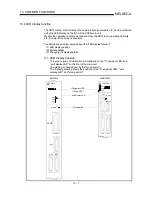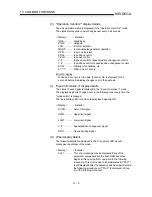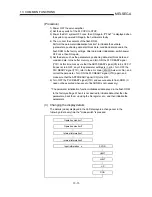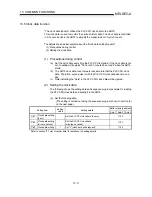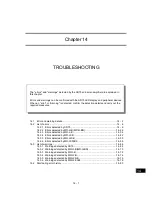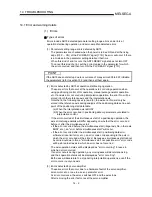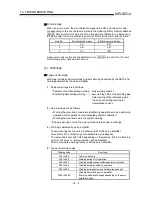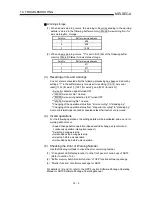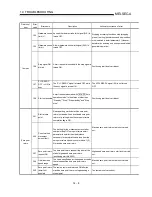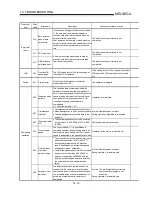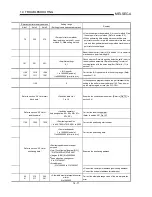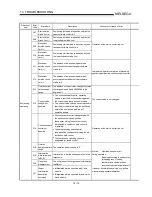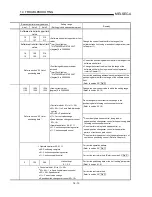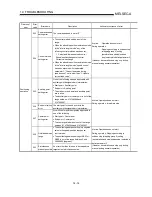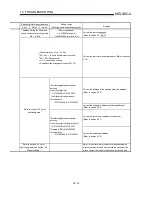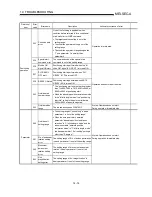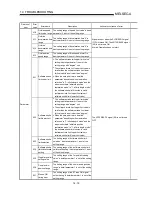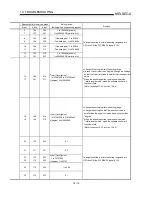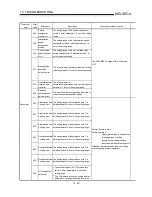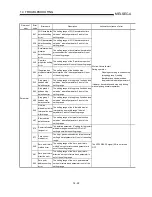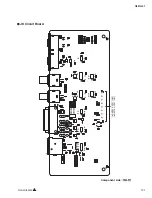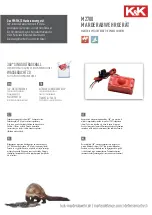
14 - 9
MELSEC-A
14 TROUBLESHOOTING
Relevant buffer memory address
Axis 1
Axis 2
Axis 3
Setting range
(Setting given in sequence program)
Remedy
After making an axis error reset (refer to [3] in Section
14.1), perform manual control operation (refer to Chapter
11) to move the axis to the position where the upper limit
signal (FLS) will not be turned OFF.
After making an axis error reset (refer to [3] in Section
14.1), perform manual control operation (refer to Chapter
11) to move the axis to the position where the lower limit
signal (RLS) will not be turned OFF.
Check the ON/OFF statuses of the stop command (output
signal/external input issued to AD75) and turn OFF the
active stop commands.
•
Output signals issued to AD75 ... Axis 1: Y13, Axis 2:
Y14, Axis 3: Y1C
•
External inputs ... External device connection connector:
Stop signal (STOP)
After checking the status of the stop command, perform
axis error resetting (refer to [3] in section 14.1) to remove
the error, then turn ON the start signal.
Turn ON the PLC READY signal (Y1D) with the BUSY
signals of all axes OFF.
809 909 1009
•
Reset the axis error (refer to [3] in section 14.1) to cancel
the error.
•
Reexamine the sequence program that has turned ON
the positioning start signal [Y10, Y11, Y12], forward run
JOG start signal [Y16, Y18, Y1A], reverse run JOG start
signal [Y17, Y19, Y1B] or " Cd. 22 Manual pulse
generator enable flag".
78 228 378
<Zero point return retry>
0, 1
•
The zero point return retry function (refer to section
12.2.1) is validated (setting: 1).
•
Using manual control operation (refer to Chapter 11) to
move from the current position (zero point) and perform
machine zero point return.
80
81
230
231
380
381
<Setting for the movement amount after
near-point dog ON>
0 to 2147483647
74
75
224
225
374
375
<Zero point return speed>
1 to 1000000 [pulse/s]
1 to 600000000 [mm/min, etc.]
•
Calculate the distance of travel according to the speed
limit, zero point return speed and deceleration speed,
and determine the movement amount after activation at
the near-point dog so that the distance of travel is larger
than the deceleration distance.
•
Set a smaller zero point return speed.
•
Adjust the near-point dog position so that the movement
amount after activation at the near-point dog becomes
longer. (Refer to sections 8.2.5 to 8.2.7)
1150 1200 1250
<Positioning start No.>
1 to 600, 7000 to 7010
8001 to 8050, 9001 to 9003
Execute mechanical zero point return (positioning start No.
9001). (Refer to section 8.2)
76
77
226
227
376
377
<Creep speed>
1 to 1000000 [pulse/s]
1 to 600000000 [mm/min, etc.]
Correct the creep speed to within the zero point return
speed. (Refer to section 5.2.5)
1150 1200 1250
<Positioning start No.>
1 to 600, 7000 to 7010
8001 to 8050, 9001 to 9003
Execute mechanical zero point return (positioning start No.
9001). (Refer to section 8.2)
Summary of Contents for A1SD75M1
Page 2: ......
Page 20: ...A 18 MEMO...
Page 22: ...MEMO...
Page 27: ...1 5 MELSEC A 1 PRODUCT OUTLINE MEMO...
Page 42: ...1 20 MELSEC A 1 PRODUCT OUTLINE MEMO...
Page 52: ...2 10 MELSEC A 2 SYSTEM CONFIGURATION MEMO...
Page 111: ...5 21 MELSEC A 5 DATA USED FOR POSITIONING CONTROL MEMO...
Page 115: ...5 25 MELSEC A 5 DATA USED FOR POSITIONING CONTROL MEMO...
Page 123: ...5 33 MELSEC A 5 DATA USED FOR POSITIONING CONTROL MEMO...
Page 127: ...5 37 MELSEC A 5 DATA USED FOR POSITIONING CONTROL MEMO...
Page 167: ...5 77 MELSEC A 5 DATA USED FOR POSITIONING CONTROL MEMO...
Page 193: ...5 103 MELSEC A 5 DATA USED FOR POSITIONING CONTROL MEMO...
Page 276: ...5 186 MELSEC A 5 DATA USED FOR POSITIONING CONTROL MEMO...
Page 332: ...7 18 MELSEC A 7 MEMORY CONFIGURATION AND DATA PROCESS MEMO...
Page 334: ...MEMO...
Page 422: ...9 64 MELSEC A 9 MAIN POSITIONING CONTROL MEMO...
Page 446: ...10 24 MELSEC A 10 ADVANCED POSITIONING CONTROL MEMO...
Page 472: ...11 26 MELSEC A 11 MANUAL CONTROL MEMO...
Page 576: ...12 104 MELSEC A 12 CONTROL AUXILIARY FUNCTIONS MEMO...
Page 745: ......

